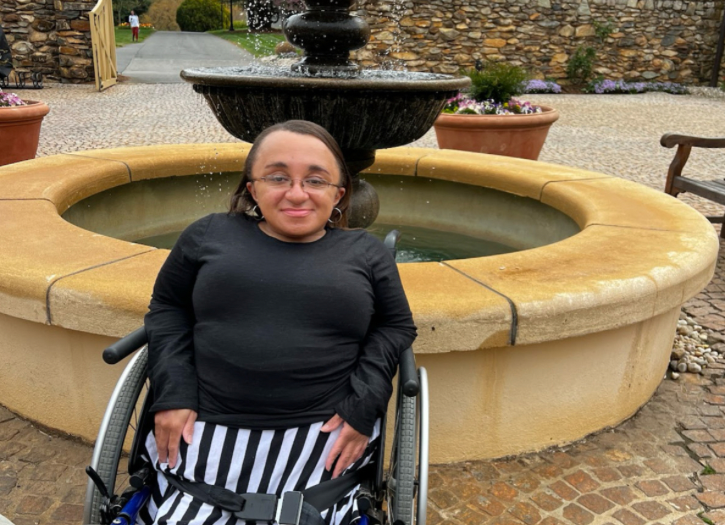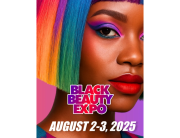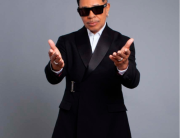How has your story motivated you on days when there seems to be nothing to keep you going?
When disabled Black women and femmes reach out to me to share that finding my work has empowered them, that causes me to remember the reason I started this work at all. Black women are my motivation to speak the truth, my truth, and to do both unapologetically.
In what ways, if any, did you have to pivot to ensure your vision was well executed?
I have always remained steadfast in the 11 years of doing this work – shining a light on the issues and realities that others aren’t familiar with. My social work background has been my grounding source in everything that I do. No matter what “hat” I wear in my work, my social work values, ethics, and principles of advocacy and being on the side of what’s just prevails.
How do you showcase the empowerment of Women’s History Month every day?
I do so by being in community with fellow Black disabled women/femmes who realize that we’re truly all that we got in this world. Having such support uplifts me in ways I cannot describe.
Who are some lesser-known female entrepreneurs from history that you admire and believe deserve more recognition?
I’ve always admired the Black women small business owners I knew growing up, from the hairdressers to those who had side hustles to make ends meet. They displayed a level of tenacity that showed me that I can go after whatever dreams or ideas that I had. You don’t have to be conventional to achieve your dreams; set out on your own path and discover what you may find.
Reflecting on your own experiences, what are some effective ways that male allies have supported you in your career journey?
In the disability community, misogyny, and specifically misogynoir, exists. Cis-het men allies have called out their brethren who are being problematic and harmful to those like myself in this space. Showing up for Black women, femmes, non-binary people, and trans people in this manner matters to ensure that all are truly safe in this community.
How do you strike a balance between ambition and self-care as a woman in a demanding business environment?
I have been more intentional to take breaks, unplug, and seek out joy and fun. I love sitting out on my porch, reading, journaling, being a planner girl, and getting into a new hobby – birding.
These activities are important for me to create time for due to the reality that this work can be heavy when I discuss topics like the discrimination disabled people endure in society. I aim to establish a balance to where respite and joy exists – I am able to gain the rest that my disabled Ancestors may not have had the ability to engage with. I can rest because of them, and I rest to honor them.
Photo Cred: Vilissa Thompson, LMSW
BIO: Vilissa Thompson is a Licensed Master Social Worker (LMSW) from Winnsboro, SC. Vilissa is the Founder & CEO of Ramp Your Voice!, an organization focused on promoting self-advocacy and strengthening empowerment among disabled people. Being a Disability Rights Consultant, Writer, & Activist affords Vilissa the opportunity to be a prominent leader and expert in addressing and educating the public and political figures about the plight of disabled people, especially Black women and femmes with disabilities. She has been featured in ESSENCE for its Black History Now 2019 series and its “Woke 100 Women” 2018 list; spoke about her entrepreneurship and activism work for Forbes; invited to be a panelist for the Know Her Truths conference at Wake Forest University; invited to be a keynote speaker at Purdue University for its Focus Awards; and appeared in MTV, Healthline, The Hill, NY Times (2020)/(2017), Black Women Radicals, Huffington Post, Buzzfeed, Bitch Media, Upworthy, Daily Dot, Daily Beast, and The Atlantic.
In addition to her activism work, she is represented as a public speaker by CCMNT Speakers, as well as co-hosts the Wheelin’ & Dealin’ podcast, which dissects politics from an intersectional lens.
She also acted as a consultant for the Sen. Elizabeth Warren 2020 Presidential campaign, where she assisted in the development of the Disability Rights & Equality policy plan.
She created the #DisabilityTooWhite viral hashtag in 2016 that addressed the lack of diversity within the disability community, and how a lack of representation impacts disabled people of color and their ability to feel fully included and accepted within the community. Demanding that diverse disabled experiences be seen within the media and the collective community is a mission for Vilissa’s activism focus, and she aims to make this a permanent reality.
Everything she does revolves around being unapologetically herself – Black, disabled, and making good trouble to shake up the status quo.







Add Comment
You must be logged in to post a comment.